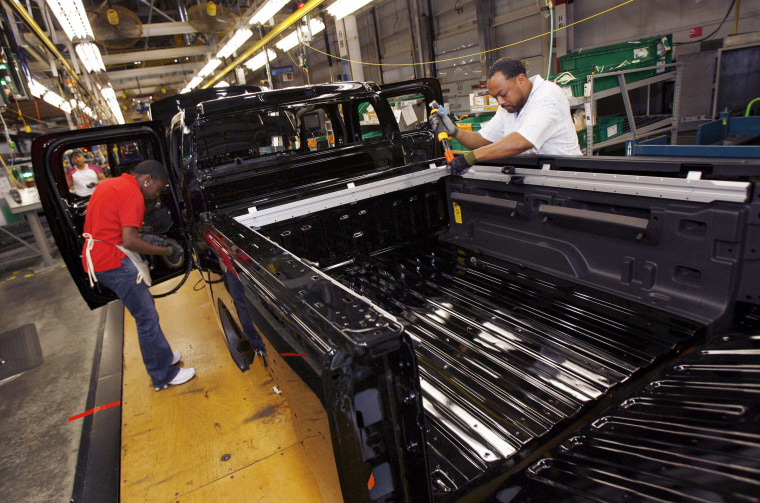General Motors Co. said Thursday that a lack of parts from Japan will force it to halt production at its pickup plant in Shreveport, La., next week.
It's the first time a U.S.-based automaker has stopped production in North America over parts shortages following last week's earthquake and tsunami in Japan.
The Japanese auto industry remained largely hobbled after the earthquake laid waste to its industrial northeast, although some manufacturers announced plans to resume limited operations.
Toyota, the world's top automaker, will start up plants for producing repair or replacement parts on Thursday. However, the company said it would keep its assembly plants throughout Japan closed through next Tuesday, affecting the production of 95,000 vehicles.
GM makes the GMC Canyon and Chevrolet Colorado small pickups in Shreveport. The company won't say which parts it's short on, but both pickups use a five-speed manual transmission made by Japanese supplier Aisin Seiki.
GM's other North American plants haven't been affected so far. GM said it will resume production as soon as possible. It has about a 70-day supply of both pickups
Ford Motor and Chrysler Group said their plants haven't been affected by shortages.
Dealers raise prices
The disaster could slow shipments of popular cars like Toyota's Prius to auto lots. And many dealers are already taking advantage of expected shortages to raise prices.
Buyers will now typically have to pay sticker prices, instead of enjoying discounts that had been the norm for small cars and hybrids imported from Japan. Besides the Prius, models that suddenly cost more include Honda's Insight, Fit and CR-V; Toyota's Yaris; and several Acuras and Infinitis.
Small cars such as the Yaris, with a $12,955 sticker price for a base model, and the Honda Insight, priced at $18,200, are losing their typical discounts of 5 percent to 10 percent.
The price increases "will last weeks, if not months," says Jesse Toprak, vice president of industry trends and insights for TrueCar.com, a website that tracks what cars sell for at dealerships.
Dealers are acting on the possibility that disruptions in car deliveries from Japan will cause a shortage of higher-demand vehicles. Demand will exceed supply.
So they won't cut deals on those cars, Toprak says.
Car buyers rarely pay sticker price, also known as the MSRP or Manufacturer's Suggested Retail Price. Companies typically offer discounts of a few hundred to a few thousand dollars off the MSRP. Many also provide low-rate financing.
On top of all that, there's typically room for further negotiation. Toyota, for example, had been offering a $500 rebate on the Prius, plus zero-percent financing. And it offered a $1,000 rebate on the Yaris.
Many smaller cars and hybrids are built in Japan, where car manufacturing has mostly stopped in the aftermath of the earthquake, tsunami and nuclear crisis.
Even before the disaster, dealers were reporting a shortage of hybrids such as the Prius, which had been in demand because of higher gas prices. The Prius uses a combination of electric and gasoline power and gets 51 mpg.
'We're going to run out of cars'
A month ago, Dave Conant said his Toyota dealership in San Diego had 57 Prius hybrids for sale. Today, he has three or four. Priuses carry a sticker price of $23,050 for a base model.
"We're going to run out of cars," he says.
So he's no longer willing to make a deal.
The disaster in Japan changed everything. Before last week, Toyota had been stepping up production of Priuses. Dealers wanted to sell as many as they could. But now, Conant says he and other dealers are no longer willing to sell their fuel-efficient cars for less than sticker price.
"We had five on the ground yesterday, and I don't know when I'll get another," he says. "The market has shifted pretty quickly and dramatically."
Some critics argue that dealers are using the Japan disaster, and the threat of car shortages, as an excuse to raise prices. Eric Ibara, director of residual price consulting for Kelley Blue Book, says any price increases in the market now are "pure speculation" that some models will face shortages.
Toyota declined to comment.
Honda spokesman Jeffrey Smith says the automaker is still assessing the impact of the Japan crisis on its supply of cars. But for now, dealers have enough Japanese imports on hand, and more are on the way, he said.
Infiniti announced price increases Monday for about half its models. Buyers will pay between $400 and $950 more per model. But Infiniti spokeswoman Paula Angelo says the price increases are unrelated to the Japan disaster.
"It's our normal practice to make mid model-year price adjustments," Angelo says.
Used car prices
Used cars may be affected, too. Higher prices on new cars will mean higher prices on used ones, says Tim Jackson, president of the Colorado Automobile Dealers Association. Once supplies of small cars and hybrids tighten and dealers stop negotiating on price, many customers lower their sights. Cheaper used cars become more appealing.
That higher demand drives prices up.
"Dealers will pay more at auction or for trade-ins, and it will result in a higher price for consumers," Jackson says.
